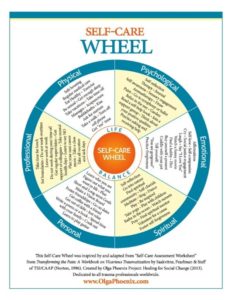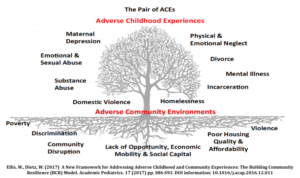This guest blog was provided by the Delaware Department of Health and Social Services (DHSS). DHSS is the CSBG Grantee for the state of Delaware.
The Delaware Department of Health and Social Services (DHSS) in partnership with Wilmington University, College of Social and Behavioral Sciences, engaged in a “Trauma Informed Approach” (TIA) pilot to raise awareness and build capacity to develop and implement strategies addressing the prevalence of trauma within health and social services systems. At the core of this initiative was the imperative to view and respond to our clients, staff, and DHSS through a trauma informed lens. This work and training was driven by a transformational question and paradigm shift that takes into account client experiences of trauma by asking “What happened to you?”, instead of “What’s wrong with you?”
 Trauma is a widespread, harmful, and costly public health problem. It occurs as a result of violence, abuse, neglect, loss, disaster, war, and other emotionally harmful experiences. Trauma has no boundaries with regard to age, gender, socioeconomic status, race, ethnicity, geography, or sexual orientation. It is an almost universal experience of people with mental and substance use disorders; the effects place a heavy burden on individuals, families, and communities.
Trauma is a widespread, harmful, and costly public health problem. It occurs as a result of violence, abuse, neglect, loss, disaster, war, and other emotionally harmful experiences. Trauma has no boundaries with regard to age, gender, socioeconomic status, race, ethnicity, geography, or sexual orientation. It is an almost universal experience of people with mental and substance use disorders; the effects place a heavy burden on individuals, families, and communities.
The need to address trauma is increasingly viewed as an important component of effective behavioral health service delivery. Additionally, according to the U.S. Substance Abuse and Mental Health Services Administration (SAMSHA), effectively addressing trauma requires a multi-pronged, multi-agency public health approach inclusive of public education and awareness, prevention and early identification, and effective trauma-specific assessment and treatment.
Delaware’s pilot program of training on a Trauma Informed Approach (TIA) was undertaken to specifically help people who experienced a traumatic event during their childhood. In Delaware, 50.4 percent of children have experienced at least one adverse childhood experience. The annual Kids Count report conducted by the University of Delaware finds that traumatic experiences during childhood can influence the overall health of the child into adulthood. The goal of this pilot was to improve trust among Delawareans and achieve more effective interventions by training human service employees to approach their work through this trauma informed lens. The approach comes at a time when Delaware is feeling the effects of the opioid crisis and the city of Wilmington leads the country in teen shootings. Although the training was primarily initiated to focus on clients, there was also the need to incorporate ways for staff to recognize their own trauma and manage their self-care while working with clients who may have experienced trauma on a day to day basis.
Over 980 Delaware Health and Social Service employees completed the TIA Training in 2018. Employees who participated in the training increased their knowledge and awareness on the prevalence of trauma and its impact on staff, clients, and systems. They also demonstrated an increase in their ability to engage in better self-care so that they can provide more effective services. Overall, staff are better able to implement policies and procedures that provide practical ways to actively resist client re-traumatization.
Currently, through the use of CSBG Training and Technical Assistance funds, all Community Action Agency staff in Delaware are participating in the TIA training. Also, Governor John Carney signed Executive Order #24, making Delaware a Trauma Informed State. The order provides direction for the Family Services Cabinet Council to lead efforts to ensure that Delaware becomes a trauma-informed state and to help mitigate the impact of adverse childhood experiences and build resilience in children, adults, and communities. It also directed all state agencies that provide services for children and adults to integrate trauma-informed best practices, including trauma specific language in request for proposals and service contracts. The Executive Order also directed the council to develop tools for training state employees and community partners on the impact of trauma and to improve services and interventions for children and families exposed to trauma.





